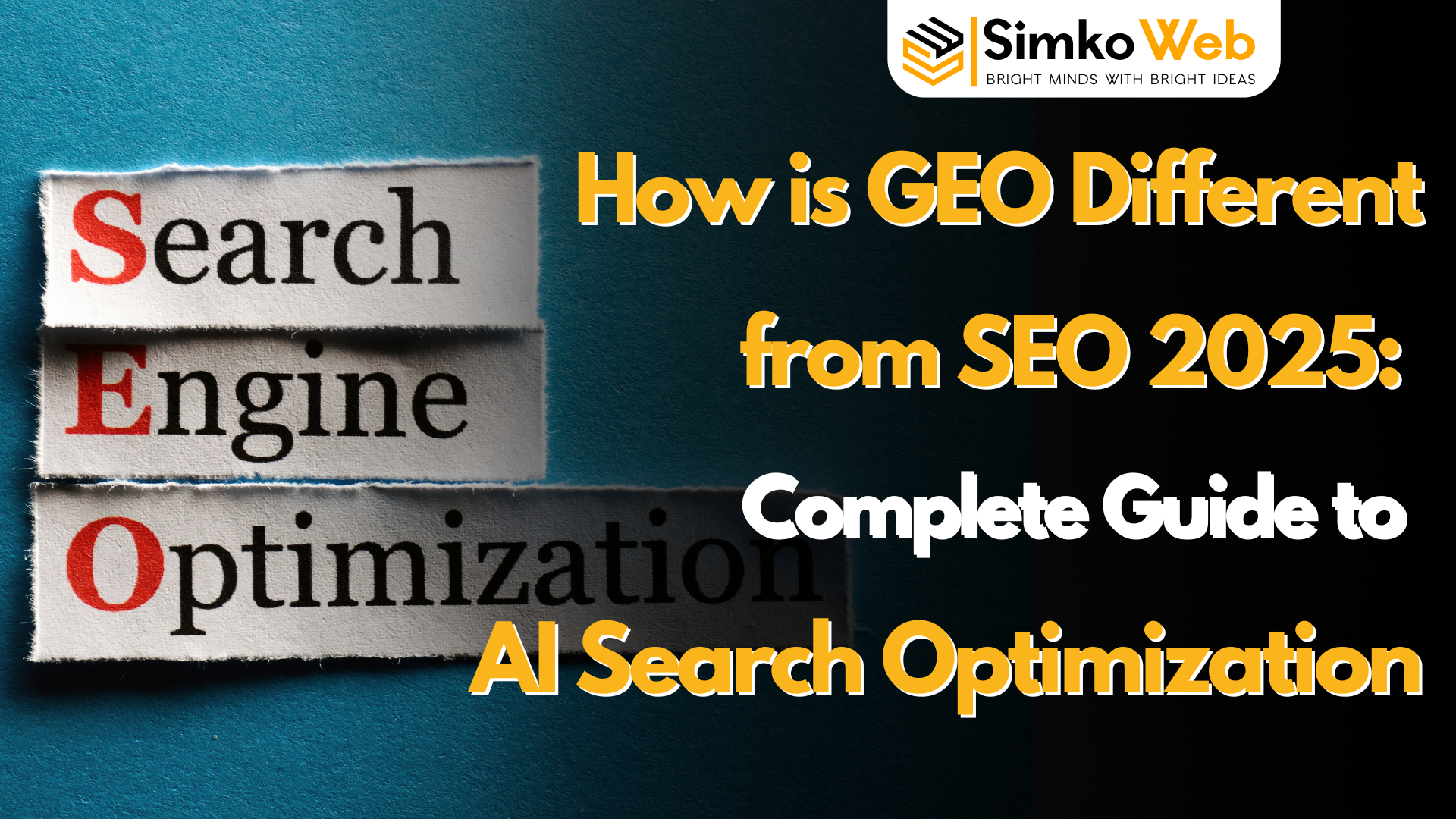
How is GEO Different from SEO 2025: Complete Guide to AI Search Optimization
- How is GEO Different from SEO 2025: Complete Guide to AI Search Optimization
- How is GEO Different from SEO 2025: Complete Guide to AI Search Optimization
- What is Generative Engine Optimization (GEO)?
- Understanding Traditional SEO in 2025
- Key Differences Between GEO and SEO
- Primary Objectives and Goals
- Target Platforms and Interfaces
- Content Optimization Approaches
- User Interaction and Behavior Patterns
- Performance Metrics and Measurement
- The Technical Differences: How Each System Works
- SEO Ranking Mechanisms
- GEO Citation Processes
- Content Structure Requirements for GEO vs SEO
- SEO Content Structure
- GEO Content Structure Requirements
- The Rise of AI-Powered Search in 2025
- Implementation Strategies for GEO Success
- Content Optimization Techniques
- Technical Implementation
- Authority Building
- The Complementary Relationship: GEO and SEO Working Together
- Future Implications and Trends
- Conclusion
How is GEO Different from SEO 2025: Complete Guide to AI Search Optimization
Explore the ongoing debate among SEO professionals about the effectiveness of LLM visibility tools, the shift from keyword to entity and topic analysis,
The digital marketing landscape is experiencing a revolutionary shift in 2025, with Generative Engine Optimization (GEO) emerging as the next frontier beyond traditional Search Engine Optimization (SEO). As AI-powered search engines like ChatGPT, Google AI Overviews, and Perplexity reshape how users discover information, understanding how is GEO different from SEO 2025 has become crucial for digital marketers and content creators.
What is Generative Engine Optimization (GEO)?
Generative Engine Optimization (GEO) is the strategic process of optimizing content specifically for AI-driven search platforms and large language models (LLMs). Unlike traditional SEO, which focuses on ranking in search engine results pages, GEO aims to get your content directly cited when AI engines answer user queries.
GEO represents a fundamental shift from keyword-oriented structures to context-driven content that AI can easily understand, extract, and reference. The primary goal is to position your brand as the go-to source that AI quotes in its answers, ensuring visibility in an era where users want instant answers rather than clicking through multiple links.
Understanding Traditional SEO in 2025
Search Engine Optimization (SEO) remains focused on improving website visibility and ranking on traditional search engines like Google and Bing. SEO operates through a three-stage process: crawling, indexing, and ranking based on factors such as keyword relevance, backlink quality, user experience signals, and technical optimization.
Traditional SEO success is measured through organic traffic, keyword rankings, click-through rates, and website visits. The fundamental approach revolves around creating content that search engines can crawl, index, and rank highly in search results pages.
Key Differences Between GEO and SEO
Primary Objectives and Goals
The most significant distinction in how is GEO different from SEO 2025 lies in their primary objectives:
- SEO Focus: Improving website ranking on traditional search engines to drive organic traffic
- GEO Focus: Optimizing content for inclusion and accuracy in AI-powered generative engine responses
Target Platforms and Interfaces
SEO targets traditional search engines including Google, Bing, and Yahoo, where users receive lists of ranked web pages to choose from.
GEO targets AI-driven generative engines such as ChatGPT, Google AI Overviews, Perplexity, Claude, and Microsoft Copilot. These platforms provide direct, conversational answers rather than link-based results.
Content Optimization Approaches
SEO Content Strategy emphasizes keyword optimization, backlink building, metadata optimization, and technical SEO factors. Content is structured around specific keywords and designed to match search intent while encouraging website visits.
GEO Content Strategy prioritizes structured content, E-E-A-T signals (Experience, Expertise, Authoritativeness, Trustworthiness), comprehensive coverage, and AI-friendly formatting. Content must be clear, scannable, and easily interpretable by AI systems.
User Interaction and Behavior Patterns
Traditional SEO relies on users clicking through to websites from search results pages. Success depends on driving traffic to your site where users can engage with your content.
GEO operates in a zero-click environment where users receive information directly in AI responses. Your content gains visibility through citations and references in AI-generated answers, even without direct website visits.
Performance Metrics and Measurement
SEO Metrics include organic traffic, keyword rankings, click-through rates, backlink quality, and conversion rates from website visits.
GEO Metrics focus on inclusion frequency in AI responses, response accuracy, citation frequency, brand mentions in AI conversations, and referrals from AI search tools.
The Technical Differences: How Each System Works
SEO Ranking Mechanisms
SEO operates on algorithm-based ranking systems using over 200 factors including content quality, backlinks, technical optimization, user experience, and relevance signals. Search engines crawl, index, and rank content based on these predetermined factors.
GEO Citation Processes
GEO functions through AI extraction and synthesis capabilities. How is GEO different from SEO 2025 becomes clear when examining how AI systems continuously absorb web content, extract key facts and relationships, assess relevance and reliability, then synthesize information for user queries.
AI systems prioritize content that provides clear, unambiguous statements of fact, presents information in structured formats, offers unique insights, and demonstrates expertise and authority.
Content Structure Requirements for GEO vs SEO
SEO Content Structure
Traditional SEO content focuses on keyword density, internal linking, meta tags, header optimization, and comprehensive coverage of topics. Content is optimized for search engine crawlers and designed to rank for specific query terms.
GEO Content Structure Requirements
How is GEO different from SEO 2025 is evident in GEO’s content requirements. GEO demands conversational, question-based content that answers queries directly. Key requirements include
- Structured Data Implementation: FAQ schema, How-to markup, and Product schema help AI systems understand content context
- Clear Answer Formatting: Direct responses to common questions in concise, scannable formats
- E-E-A-T Signal Optimization: Demonstrating expertise through credentials, real-world experience, and authoritative sources.
- Natural Language Optimization: Content that matches conversational query patterns used in AI tools
The Rise of AI-Powered Search in 2025
The statistics reveal why understanding how is GEO different from SEO 2025 is crucial. ChatGPT reached 5.14 billion total visits in April 2025, marking a 182% year-over-year increase. ChatGPT has officially overtaken Wikipedia in monthly website visits, reflecting the accelerating shift toward generative search.
Gartner projects that by 2026, traditional search engine volume will drop 25% as AI chatbots and answer engines absorb more queries. With over 60% of Google searches in 2024 resulting in zero clicks, the trend toward direct answers without website visits is clear.
Implementation Strategies for GEO Success
Content Optimization Techniques
Implementing GEO strategies requires focusing on question-based content that directly answers user queries. Create comprehensive FAQ sections, implement structured data markup, and ensure content demonstrates clear expertise and authority.
Technical Implementation
Use JSON-LD structured data format for FAQ, How-to, and Product schemas. Implement proper heading structures (H1-H3), create scannable content with bullet points and numbered lists, and ensure fast loading times with clean HTML.
Authority Building
Establish expertise through author bios, credentials, case studies, and customer testimonials. Build trustworthiness through accurate information, transparent sourcing, and regular content updates.
The Complementary Relationship: GEO and SEO Working Together
How is GEO different from SEO 2025 doesn’t mean they compete – they complement each other. Research shows that 99% of URLs shown in AI Mode appear in the top 20 organic search results. This connection demonstrates that strong SEO fundamentals support GEO success.
A dual-engine strategy combines traditional SEO for organic search traffic with GEO for AI-driven visibility. SEO brings traffic from traditional search behaviors, while GEO ensures presence in AI-generated responses and voice search results.
Future Implications and Trends
The shift toward AI-first search represents a paradigm change in how consumers seek and interact with information. How is GEO different from SEO 2025 reflects this evolution, with GEO becoming essential for maintaining digital visibility as search behavior continues evolving.
Key trends shaping the future include increased voice search adoption, growing reliance on AI tools for information discovery, and the expansion of zero-click search experiences. Brands that adapt to both SEO and GEO strategies will maintain competitive advantages in this changing landscape.
Conclusion
Understanding how is GEO different from SEO 2025 is essential for digital marketing success in the AI-driven era. While SEO focuses on traditional search engine rankings and website traffic, GEO optimizes for AI citations and zero-click visibility in generative search platforms.
The key differences span objectives, target platforms, content strategies, user interactions, and performance metrics. However, these approaches work best when implemented together, creating a comprehensive strategy that addresses both traditional and AI-powered search behaviors. How is GEO different from SEO 2025 ultimately comes down to evolution rather than replacement. As AI search continues growing, successful digital marketers must master both approaches to ensure comprehensive online visibility and sustained organic growth in the changing search landscape.
Digital Advertising for Healthcare Business: The Strategic Blueprint for 2026
In the rapidly evolving landscape of the Indian medical sector, traditional outreach is no longer…
Healthcare Website Development: A Strategic Guide to Patient Acquisition in 2026
Healthcare Website Development: A Strategic Guide to Patient Acquisition in 2026 In the rapidly evolving…
Generative Engine Optimization (GEO): Best GEO Strategy for 2026.
Generative Engine Optimization (GEO): Best GEO Strategy for 2026. The digital landscape is witnessing its…
AI-powered search AI search optimization Bihar business website business website Patna content optimization strategies cosmetic brand website digital marketing digital marketing agency digital marketing agency Haryana digital marketing agency UP digital marketing for jewelry digital marketing trends 2025 e-commerce platform Generative Engine Optimization generative search engines GEO vs SEO in 2025 google ai studio prompt gallery Haryana website services How to Sell Jewellery Online in 7 Steps jewellery e-commerce jewellery e-commerce marketing jewellery SEO optimization jewellery social media marketing jewelry business guide jewelry SEO jewelry website development Kanpur digital marketing local SEO services Lucknow web development mobile website optimization online jewellery promotion strategies online jewelry marketing online jewelry store sell jewellery online SEO company Bihar SEO differences 2025 SEO strategies Simko Web Simko Web digital marketing agency social media marketing Patna structured data implementation UP digital marketing website importance 2026 What Is Digital Marketing zero-click search optimization






